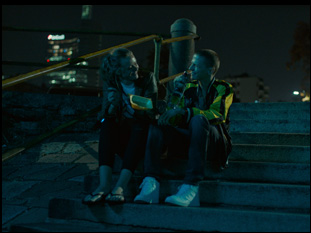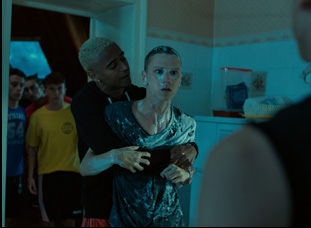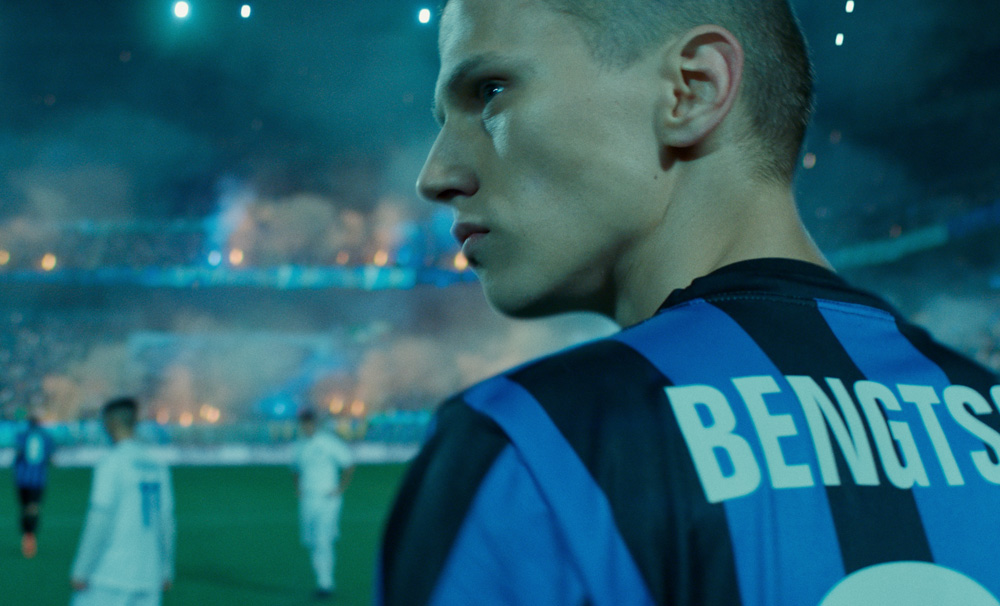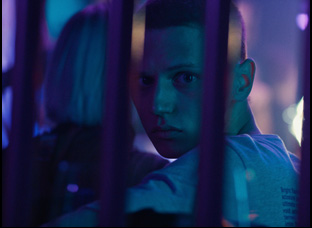There’s a striking image roughly midway through “Tigers” in which Matti (Erik Enge) has reached his breaking point, having come from his native Sweden to play soccer in Milan, only for the professional squad he’s been signed to at 16 be as disappointed in his performance as he is in the fact that they haven’t lived up to their contract obligations to him such as affording him a private room and a lack of playing time during games. He lets out his frustrations when no one’s watching in a dark alley, but the street lights reveal that he does have some onlookers in a nest of birds that look as much out of place in the city as the player does in Italy.
“I was playing a lot with the idea of animals in cages — the title is referencing animals in cages that people are paying to watch, so when we were location scouting, there was this strange area in the garden where I told my production designer that it would be nice to have some birds here,” said the film’s writer/director Ronnie Sandahl, who worried the allusion might be a little too on the nose. “You’d think somebody would stop you, but they don’t. That’s the great and horrifying thing with being a director. You pretty much always get your ideas through.”
In the case of “Tigers,” it is very much a positive that Sandahl’s vision made it directly to the screen, telling the uncompromising tale of a would-be soccer star who struggles with being seen only as a commodity in the hands of the club nurturing his development as a player and leads to a chilling effect on his mental health both on and off the field. The film is based on the real-life experience of Martin Bengtsson, a one-time soccer prodigy whose autobiography “In the Shadow of San Siro,” recounting what he endured, led him to cross paths with Sandahl, who was on the book tour circuit at the same time with his first novel (“Vi som aldrig sa hora”) and began thinking about making movies. It may have taken awhile before Sandahl felt comfortable enough to take on Bengtsson’s globetrotting story, but the wait was worth it when “Tigers” so readily accesses all the emotions stirring inside Matti as he realizes that despite receiving a huge signing bonus, the level he has to start out at pushes every player to play for themselves rather than their team when promotions to the next level are on the line and cuts are made all the time.
Despite finding a friend on the squad who shares English in common (Alfred Enoch) and even gaining a girlfriend (Frida Gustavsson) who can relate to his experience of being prized for his physical attributes and given little regard for anything else as a model, Matti finds it rough to ride the highs and lows of his first professional season where he feels he has far more opponents around him in the dorm he sleeps in than he ever sees on the turf. After picking up prizes for best film at the Busan and Goteborg Film Fest, among others, the energetic drama was selected by Sweden as its official entry to the Oscars for Best International Film and while in Los Angeles recently, the writer/director spoke about how the film is a companion piece of sorts to Janus Metz’s 2017 drama “Borg vs. McEnroe” and Olivia Wilde’s upcoming “Perfect,” both of which he wrote, coordinating an international production and the work required on the part of his lead actor Erik Enge to transform into a professional-level soccer player.
It’s a story you never heard before from the inside of the soccer world, [which] has been and still is very closed. I realized even though I was only 22 at the time I got to know Martin, very seldom do these stories leak out about the underbelly of the soccer industry or the sports industry in general, so we made this drunk pact [to adapt his book]. I wasn’t really a filmmaker. I was just about to make my first short film and he had all these offers from big producers that wanted to make a film on his life story, but he decided to say no to everyone else and wait for me. We became friends over the course of years, so he was always involved in the sense that I informed him of what was happening and he read a couple of versions of the script, but he wanted to let me make the film I wanted to make and he only basically had one rule, which was to make the best possible film and something that rings true. I’m forever thankful for that and he’s been extremely generous all throughout the process.
It has such an elegant structure to it as this year-in-the-life – was it difficult to crack?
It was actually because normally in a film that is set in a world of sports, they have all these obstacles in the way and then it ends with this success in the climax. Here, the success comes at midpoint and it turns out to be quite problematic, so I’m folding the film halfway through and it becomes something else. When I realized that from the midpoint, it needs to have that uncertainty and unpredictability that “wait, a sports film should not take this turn,” that always attracted me to do something different. I’m not even sure it’s a sports movie. It’s set in the world of sports, but when critics write about it, they tend to compare it more to “Black Swan” or “Whiplash” where they’re set in very specific worlds, but first and foremost, it’s a drama.
Still, you’ve said this actually opened up an entire trio of a films set in the sports world, starting with your script for “Borg Vs. McEnroe” and your next script to be produced, “Perfect” about Kerri Strug’s Olympic triumph that I can imagine explores another part of an athlete’s psychological experience. Did writing these inform one another?
Yeah, it’s slightly megalomanic to start with the idea of making three films instead of one, but I got so interested in the minds of athletes and I thought they’re quite different — the worlds of tennis, the world of soccer and the world of gymnastics, but at the same time, it reminds me that young people become commodities on the market and [they’re] also environments that attract young people that want something so extremely much. [They’re] extreme characters in that sense and [each of the three films] all have different angles on it. I would say, “Borg Vs. McEnroe,” the first installment was really for me a film about rage and two different ways of handling rage between Bjorn Borg and John McEnroe whereas “Tigers” is more about maybe the financial perspective of football and the human value versus the financial value. And in “Perfect,” which is set in the world of gymnastics in America in the ‘90s is really a story about rivalry and sisterhood, so I’m very much looking forward to seeing what Olivia Wilde will do with it. She’s such a fantastic filmmaker, so I’m happy to let her lead that one. I always knew that “Tigers” would be the only one I would direct.

Yeah, it’s a bit complicated that it’s so international when it comes to language because it’s in Swedish, English and Italian, but at the same time, it felt like a gift to have this setting where it’s totally normal that there are different languages and also something you can use as a dramatic tool. In the story when the 16-year-old Martin Bengtsson comes to Italy as a professional footballer, he doesn’t understand a word of English, so it’s a tricky situation to be 16 and come to this situation as it is, but then to also not understand a word, it certainly ramps up the loneliness. But in terms of making the film, it was of course challenging to work with a crew and also cast from different countries, but to have all these Italian actors — everyone knows what a pool of talent they have when it comes to actors — so it was just fantastic.
What sold you on Erik to play Martin?
I knew already from when he stepped in the room he had something that I was curious about — this intensity and combination of fragility and brutality that felt real and felt raw. But he had to make a huge physical transformation for the film. He had to gain 10 kilos of muscles, [which] took about a year and he had to change pretty much everything about himself. Also when it comes to him as a human being, it was a really huge character [to get into]. But when you find that kind of new face where you know he can be one of the biggest actors in a few years, that’s the kind of quality that he has and it’s amazing to be the one who have him in a film at this early stage. And as I told him when I cast him, this will be the equivalent of extreme sports in the world of acting because you’re going to be in not only pretty much every scene, but every shot, so when they were talking about where to put his trailer, I told them I don’t care because he will never be there. [laughs]
It looked like you never had any quiet moments to yourself, either. What was it like shooting those massive party scenes?
Yeah, the party scenes are pretty crazy and sometimes as a writer/director, you’ve got to pinch yourself on the arm because you come up with all these stupid ideas and then you’ve got to direct them. [laughs] You’re thinking that when you’re saying, “Okay, I want a hundred people in animal masks and put some of them on the roof and let’s remake this whole place into this strange nightclub where everything’s about animals, you figure at some point, someone would say, “Maybe it’s enough,” but no one did, so I just went for it.

Yeah, we were talking a lot about what kind of music exists in this world and what does football sound in terms of music? And I realized by watching footage of soccer silent and [in] closeup, Vivaldi’s a good reference, so that informed the score a lot and with the contemporary music, I wanted this kind of brutal, raging techno music that’s within that world and that really helps to also portray the adrenaline and masculinity of the movie. That also goes for the lighting. I wanted this kind of unnatural colored light with the natural sunshine in other scenes.
What’s it like for the film to be getting out in the light of day itself now?
It’s amazing. It had a nice festival run with a lot of awards, but that was detached from me [because] I wasn’t really there because of COVID, so I’m happy now to travel around with it and meet the audience and to have these very interesting conversations about the film like we’re having right now where you get to see another part of your own film in a way through questions. I’m just hoping that we’re staying in the [Oscar] competition a little longer, so I can talk to more people and discuss the film.





